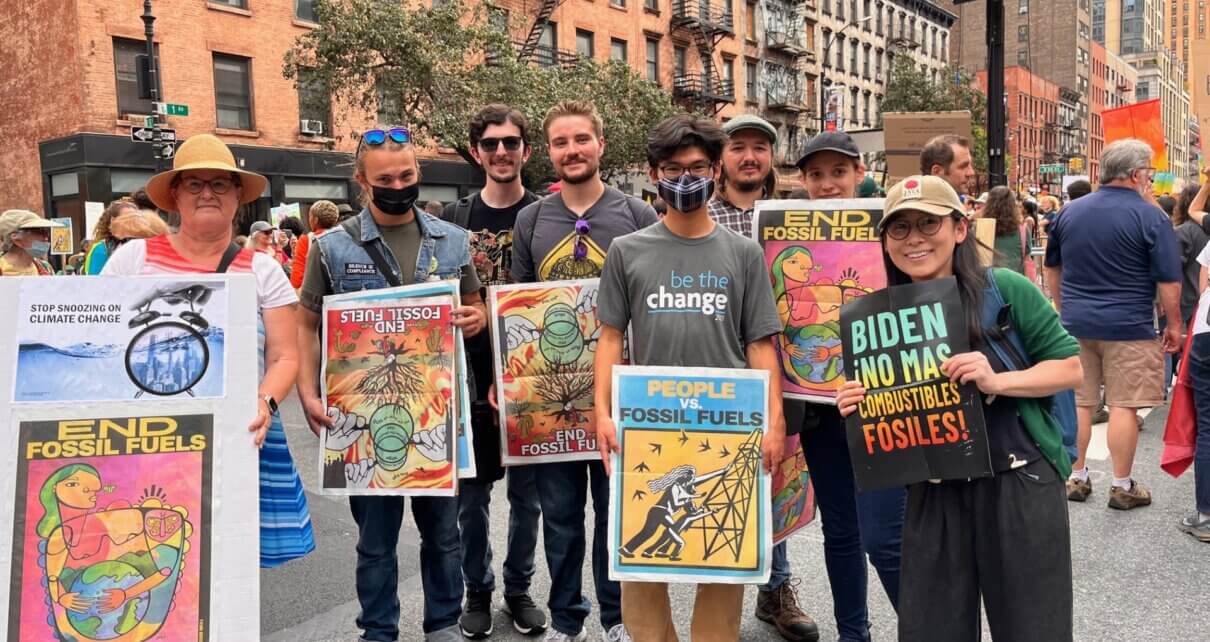On Sunday, Sept. 17, Monmouth students and professors showed their support at the March to End Fossil Fuels, which took place in New York City, New York on 56th and Broadway. According to endfossilfuels.us, America is the largest producer of oil and gas in the world and pollution from oil, gas, and coal is deadly, which is why there were record-breaking heatwaves this summer and so much toxic wildfire smoke.
Over 700 organizations have endorsed this march to start a discussion among people and high officials in the United States. The main goals of this march are to stop federal approvals for new fossil fuel projects and repeal permits for climate bombs, like the Willow Project and the Mountain Valley Pipeline, stop fossil fuel drilling on public lands and water, and transition to renewable energy such as solar or wind that generates millions of jobs while supporting workers’ and community rights, job security, and employment equity. It is a project that is going to take time and convincing the right people that if systems are not put into place now then the U.S. will have done irreversible damage.
Catherine Duckett, Ph.D., Associate Dean for the School of Science, said, “Nobody is naive enough to think that the U.S. will stop the use of fossil fuels tomorrow, but if 3.9% of people stand for this, then U.S. officials will take note of it.”
The March comes at a vital time because on Wednesday, Sept. 20, the United Nations is calling on world leaders to take real steps to lead us off fossil fuels to protect people and the planet. People are demanding that President Joe Biden choose a side that is with the people or the CEO’s of fossil fuel companies. Biden broke his promise to lead us off fossil fuels. Instead of championing climate justice as he said he would, he’s expanded oil and gas drilling, production, and export.
Duckett added, “I don’t believe that President Biden is entirely convinced that climate change is a real threat to him and his grandchildren but he listens to those who care, and I say that because I’ve been in the same room as him.”
While people are pressuring Biden to choose a side he might be listening to the people’s outcries. An article by PBS.org, written by Becky Boher and Matthew Daly, claimed that the Biden administration canceled the seven remaining oil and gas leases in Alaska’s Arctic National Wildlife Refuge on Wednesday, overturning sales held in the Trump administration’s waning days, and proposed stronger protections against development on vast swaths of the National Petroleum Reserve-Alaska.
Lincoln Pereira, a junior history and education student, said, “This march is meant to rally together people from across the world. We are placing the spotlight on our world leaders by gathering outside of the United Nations and telling them they must unify rather than shift blame and evade responsibility. By meeting in New York City, U.S. Citizens are telling their country that we see past all the superficial changes they claim to make in our fight against climate change; basically, we want to hold our leaders accountable.”
Jacques Peter, Ph.D., Rechnitz Family Endowed Chair in Marine & Environmental Law and Policy, added, “A march like this is meant to bring national and international awareness, but more importantly to pressure leaders to make policy that incorporates protesters interests, including a transition from fossil fuels. This comes right before Climate Week at the UN and ahead of 28th November’s Conference of Parties for the UNFCCC, which will be in Dubai and will be presided over by the managing director and group CEO of the Abu Dhabi National Oil Company.
“The attendance for the March was truly amazing. People from as far as Ecuador attended the March and spoke at the Rally afterward. Tens of thousands of protesters gathered in the heart of New York City to have their voices heard,” explained Tyler Bane, a senior history student who attended the march.
Bane believes that more awareness about climate change and the impact that fossil fuels have with the record attendance and vast coverage of this event. “This was a historic event preceding the UN symposium on Climate change, with record attendance, a clear message, and coverage in numerous publications including the New York Times, and Associated Press.”
According to Bane, the highlight of this event was when everyone in the march was walking together in the streets of New York City toward the world leaders of the United Nations.
“For me, it was the feeling of just how powerful everyone was as we came together to March through the center of the city towards world leaders at the United Nations. That sense that this is not hopeless and we can demand our leaders to do better,” Bane explained.
William Schreiber, Ph.D., lecturer of Medical Lab Science, said, “I believe this march is coming at an important time, given the United Nations focus on the problem next week. Given the broad interest and very broad support for the march, it is important that we have a solid turnout to show that there is great public concern for the climate problem. On a personal level, it gives an opportunity for concerned individuals to express their concerns in a way they may not have done before.”
A significant way that people can decrease their carbon footprint, is by using public transportation, using LED lights, biking or walking to places if accessible, minimizing the use of heating and air conditioning, and usage of clean electricity such as solar or wind.
“Individuals can decrease carbon footprint in many ways – some are not costly but others require considerable resources. I think the starting point is to become very aware of all the ways we use energy. Examples of no or low-cost items: Reduce car trips by thoughtful planning.
biking or walking when appropriate replacing light bulbs with LEDs, and minimizing the use of heating and air conditioning by dressing appropriately indoors. Use a service that provides electricity from clean energy sources like wind and solar. There are a number of these that work with your regular electricity supplier,” Schreiber explained.
He goes on to explain more expensive means of energy sources such as more efficient appliances, particularly for heating and air conditioning and electrical vehicles.
“More efficient appliances, particularly for heating and air conditioning. Heat pumps are probably the best alternative at this time. Electrical vehicles: expensive, but getting less so. As the electric grid becomes more “green”, EVs become lower in carbon footprint. Consider energy
efficiency, including the size of vehicles. Regardless of type, larger, heavier vehicles require more energy to get around,” said Schreiber.
Pereira added, “There are a number of ways to personally decrease your carbon footprint, including using public transportation and changing your diet away from animals and animal byproducts. However, personal change is a drop in the bucket to the amount of destruction carried out by irresponsible and all-consuming corporations; the best way to reduce your carbon footprint is to get those in power to change their ways.”
Kyle Seiverd, Adjunct in the Biology Department, said, “Hopefully this shows high representatives that aren’t acting on climate change that there is a mass of people that want them to take this topic seriously and all those people are voters. If they have an election coming up in a year or two maybe this will push them to act because they want those people to vote for them.”
He goes on to say from a personal standpoint if you went to the March or helped in any local capacity it is good to see that there are other people in the same fight sharing the same priorities.
“From an individual standpoint if you went to the March or actively help in any local capacity it is good to see that there are other people in the same fight sharing the same priorities,” Seiverd said.
Seiverd continues by commenting on renewable energy sources that depending on where you live there are specific renewable energy sources that will not work such as thermal for the state of New Jersey.
“When discussing renewable energy we have to talk about all renewable types of energy because there are certain places that don’t have potential for thermal such as New Jersey, but Iceland does so when we are talking about New Jersey and changing our energy grid we have to look at solar, wind and nuclear and will likely be a combination of those three.”
If change is occurring it will be for the better for multiple reasons, due to the increase in heat, hurricanes, cost in damages, the ability to breathe clean air, and people who are severely affected by climate change.
“Home insurance went up in Florida after hurricane Ida, some insurance companies have pulled out of certain states, fossil fuels are causing damage, climate change is going to cause extinction, as circumstances grow crazier, populations will be at risk, just think about how many animals died in the Canada wildfires,” Duckett said.
“When trying to find renter’s insurance for my housing this year, many insurance companies refused to serve me due to my proximity to the beach. Outside of extreme weather, climate change has negatively affected air, soil, and water quality across the world. With this comes a number of health issues, including allergies, asthma, and weakened immune systems from lower-grade produce and livestock. Our personal health is directly tied to the world’s health; if we want to be healthy, we must take care of the world,” Pereira added.
“It has become increasingly clear in recent years that severe weather events are becoming more and more common: Droughts and excessive heat bring devastating fires, and fierce storms causing great damage, personal injury, and loss of life, the added heat results in more melting of glaciers and ice shelves, causing sea level to rise. Some island nations are severely threatened these are worldwide events that have more severe impacts in less wealthy parts of the world,” Schreiber added.
“What I think back to is this summer and the endless heat I’m a runner and I love running outside and I can’t tell you how few days I could go out in the morning to run this summer because it was so hot, if you are driving your car you might have to leave your ac on blast and if your car is fossil fuel dependent you are going to end up using more fossil fuels which only magnifying the effects of climate change,” Seiverd commented.
Climate change is real, it is impacting not only our country but the world, it affects not only humans but every living organism. The time for discussion is over and the time for change is now.




